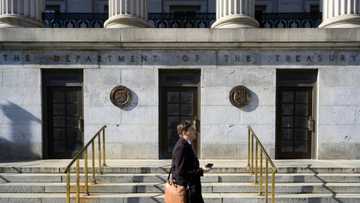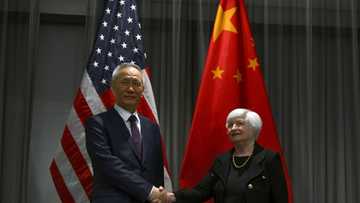Boeing ordered to face MAX victims' families in US court

Source: AFP
PAY ATTENTION: Click “See First” under the “Following” tab to see Legit.ng News on your Facebook News Feed!
A US federal judge on Thursday ordered Boeing to appear in court next week to face family members of those killed in crashes of the 737 MAX who are challenging the aviation giant's prior government settlement.
US District Judge Reed O'Connor rejected Boeing's argument that its presence at an arraignment wasn't required, directing the company to have an "appropriate person" at a January 26 hearing in Fort Worth, Texas.
A Boeing spokesman declined to comment.
The case concerns a deferred prosecution agreement announced in January 2021 in which Boeing paid over $2.5 billion in fines and restitution to settle US Department of Justice (DOJ) charges it defrauded regulators overseeing and certifying the 737 MAX.
DOJ officials at the time slammed the company for "half truths" and engaging in a "cover up" of problems with its planes, but the agency has not prosecuted high-ranking Boeing executives in the wake of the debacle.
Two crashes of Boeing planes in October 2018 and March 2019 resulted in 346 fatalities and led to a global grounding of the MAX model for more than a year and a half.
PAY ATTENTION: Subscribe to Digital Talk newsletter to receive must-know business stories and succeed BIG!
Attorneys representing victims argue that federal law mandated that the DOJ should have consulted with victims before an agreement.
Federal law requires that crime victims "have the right to confer with the attorney for the Government, the right to restitution, the right to be treated with fairness and respect for the victim's dignity and privacy and the right to be informed in a timely manner of any plea bargain or deferred prosecution," said a November 22 motion.
Robert Clifford, a senior partner at Clifford Law Offices, which is representing 737 MAX victims, said Thursday's ruling opens the door to more actions, including potential prosecution of corporate officials.
O'Connor "can stand behind the agreement... or he could open it up completely and do more," Clifford said.
But Jacob Frenkel, an expert in government investigations of corporations at Dickinson Wright, said judges are typically reluctant to revisit a deferred prosecution.
"There is a lot of deference that courts give to an agreement that companies reached with the Justice Department," Frenkel told AFP.
Deferred prosecution agreements are "an important tool in corporate compliance and the DOJ’s ability to be able to expedite and facilitate cooperation" from companies, he said.
Source: AFP



